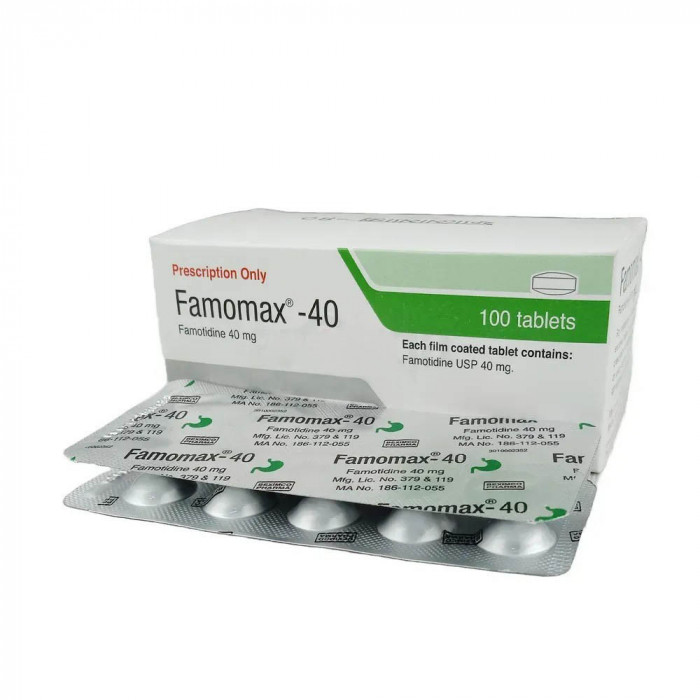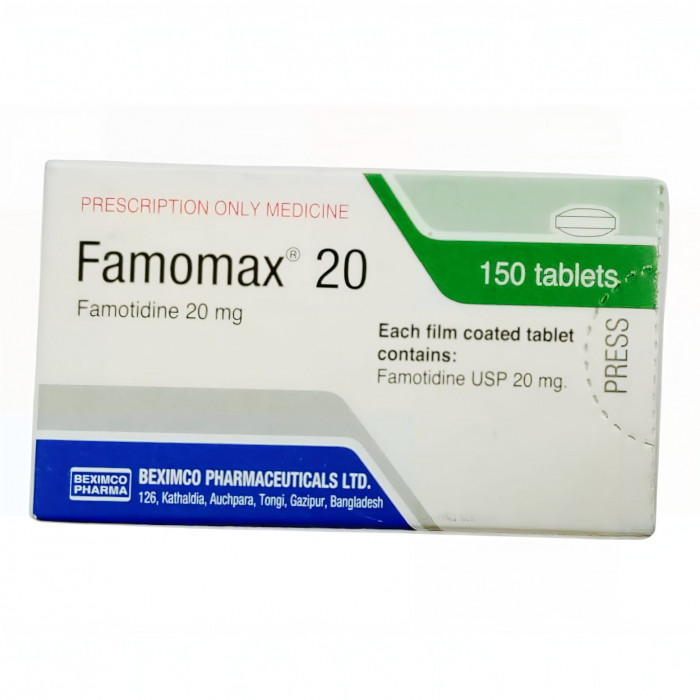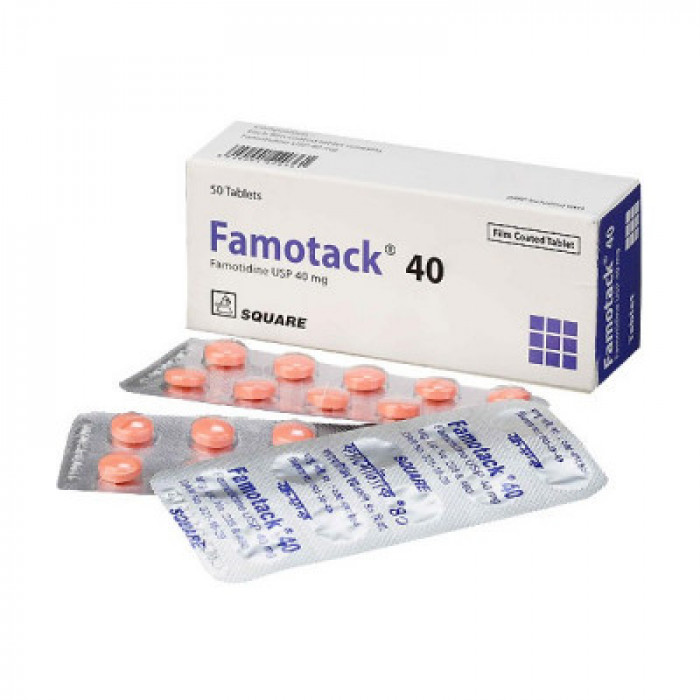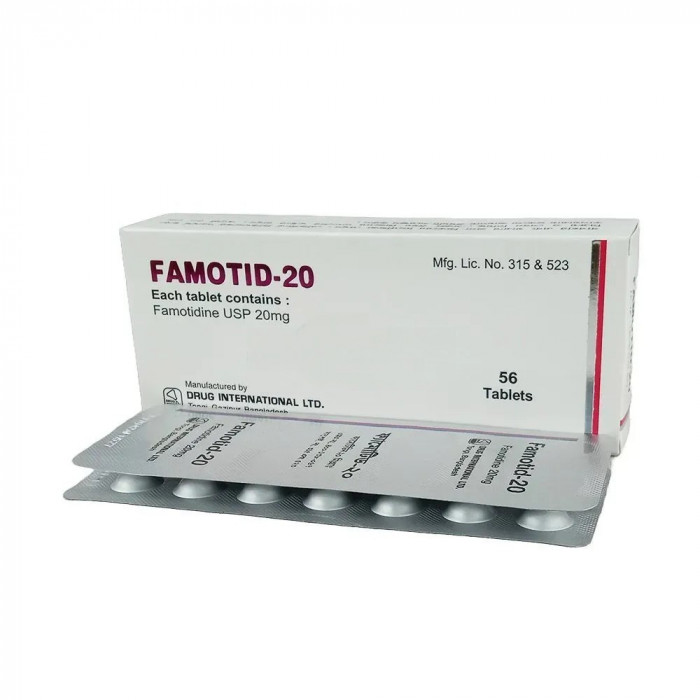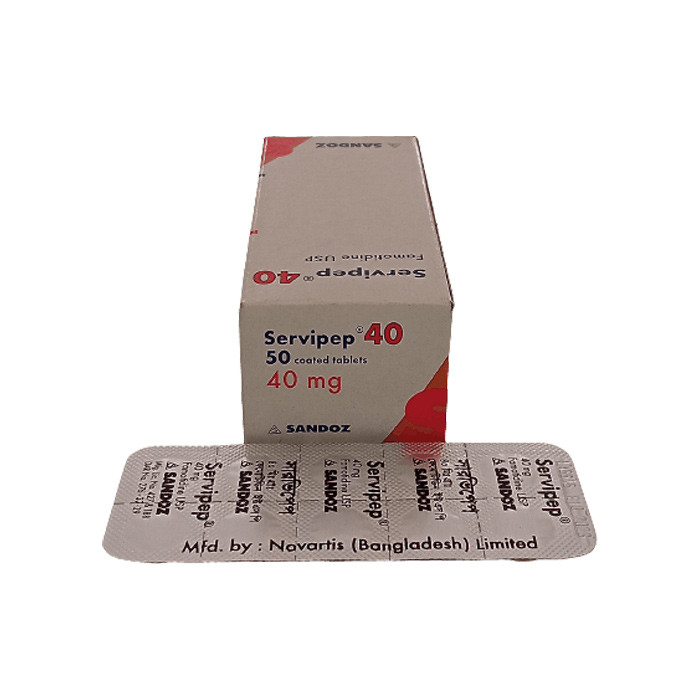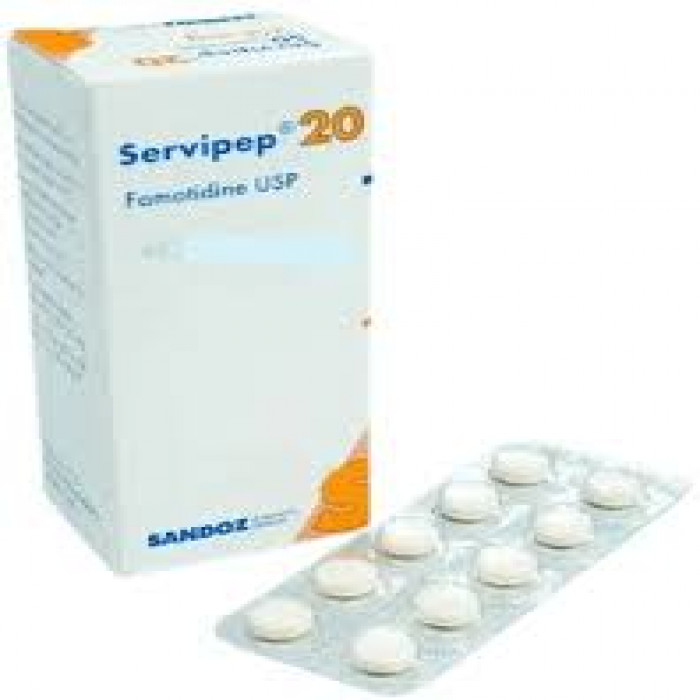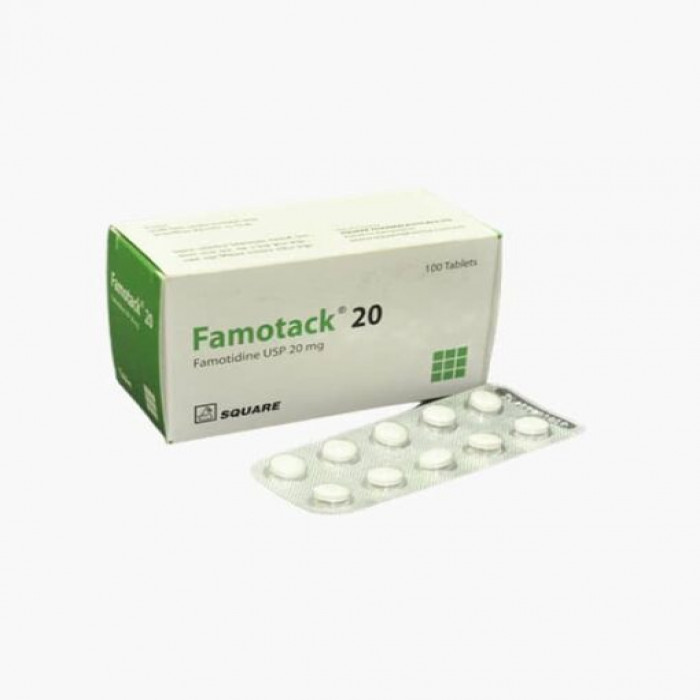
✔ 100% Authentic Product
👁️ Currently Viewing 5603
Famotack 20mg Tablet contains Famotidine an antacid medicine.
Discount
Price: ৳ 43
MRP:
৳
45
5%
Off

100% Genuine Products, Guaranteed

Safe & Secure Payments, Always

Fast, Secure & Efficient Delivery

Proper Packaging
 Cash on Delivery - All over Bangladesh
Cash on Delivery - All over Bangladesh Regular Delivery - 12-24 Hours, Dhaka City* Charge Tk.39-59
Regular Delivery - 12-24 Hours, Dhaka City* Charge Tk.39-59 Regular Delivery - 24-48 Hours, Other Cities* Charge Tk.99-110
Regular Delivery - 24-48 Hours, Other Cities* Charge Tk.99-110
🌙 রমযান অফার 🌙
 ফ্রি ডেলিভারিঃ - ৭৯৯ টাকা+ অর্ডারে, ঢাকা
শহরে
ফ্রি ডেলিভারিঃ - ৭৯৯ টাকা+ অর্ডারে, ঢাকা
শহরে ফ্রি ডেলিভারিঃ - ২৭৯৯ টাকা+ অর্ডারে, ঢাকার
বাহিরে
ফ্রি ডেলিভারিঃ - ২৭৯৯ টাকা+ অর্ডারে, ঢাকার
বাহিরে
📲 মোবাইল অ্যাপ অর্ডারে সাশ্রয় বেশী
-
Google Play Store থেকে ডাউনলোড
-
Apple Store থেকে ডাউনলোড
100% Genuine Products, Guaranteed
Safe & Secure Payments, Always
Fast, Secure & Efficient Delivery
Proper Packaging
 Cash on Delivery - All over Bangladesh
Cash on Delivery - All over Bangladesh Regular Delivery - 12-24 Hours, Dhaka City* Charge Tk.39-59
Regular Delivery - 12-24 Hours, Dhaka City* Charge Tk.39-59 Regular Delivery - 24-48 Hours, Other Cities* Charge Tk.99-110
Regular Delivery - 24-48 Hours, Other Cities* Charge Tk.99-110 ফ্রি ডেলিভারিঃ - ৭৯৯ টাকা+ অর্ডারে, ঢাকা
শহরে
ফ্রি ডেলিভারিঃ - ৭৯৯ টাকা+ অর্ডারে, ঢাকা
শহরে ফ্রি ডেলিভারিঃ - ২৭৯৯ টাকা+ অর্ডারে, ঢাকার
বাহিরে
ফ্রি ডেলিভারিঃ - ২৭৯৯ টাকা+ অর্ডারে, ঢাকার
বাহিরে- Google Play Store থেকে ডাউনলোড
- Apple Store থেকে ডাউনলোড
🌙 রমযান অফার 🌙
📲 মোবাইল অ্যাপ অর্ডারে সাশ্রয় বেশী
✅ Description:
- Famotack 20mg Tablet is a prescription medication used for the treatment of various conditions such as duodenal ulcers, gastric ulcers, gastritis, gastroesophageal reflux, and pathological hypersecretory conditions. It belongs to a class of drugs known as histamine H2 blockers, which work by reducing the production of stomach acid.
- Famotack 20mg Tablet, also known by the trade name Pepcid, provides relief from symptoms like heartburn, acid indigestion, and sour stomach. It is effective in healing gastric and duodenal ulcers, as well as esophagitis.
- While using Famotack 20mg Tablet, it is important to be aware of possible side effects, including dizziness, seizures, depression, sexual problems, headache, shortness of breath, constipation, and diarrhea.
- Before taking this medication, it is crucial to inform your doctor or pharmacist if you have any allergies to famotidine or other medications if you are taking any prescription or non-prescription drugs, herbal medications, or medications for heartburn. You should also disclose your medical history, including any history of QT syndrome, asthma, breathing problems, pregnancy, breastfeeding, phenylketonuria, or kidney disease.
- The recommended dosage of Famotack 20mg Tablet should be followed as prescribed by your doctor, and it is important to measure the liquid form of the medication accurately. Following a proper diet along with the medication can help in healing ulcers within four to eight weeks.
- If you experience chest pain while taking Famotack 20mg Tablet, it is advised to seek immediate medical attention as it could be a sign of a possible heart attack.
- In case of a missed dose, take it as soon as you remember. However, if it is close to the time for your next dose, skip the missed dose and do not take extra medication to make up for it. Overdosing on this medication can have adverse effects, so it is important to seek medical help immediately if an overdose occurs.
- Please note that the information provided here is based on the salt content of the medicine, and the specific uses and effects may vary from person to person. It is always advisable to consult a gastroenterologist before using this medicine.
Safety Advices

Alcohol
UNSAFE
Avoid alcohol, as this may potentiate adverse effects like the drowsiness of this medicine.

Pregnancy
CONSULT YOUR DOCTOR
Famotack 20mg Tablet is not recommended for use in pregnant women or women planning to have a baby unless your doctor thinks the benefits outweigh the risks. Consult your doctor before taking it.

Breastfeeding
CONSULT YOUR DOCTOR
Famotack 20mg Tablet is generally not recommended for use in breastfeeding women as it may pass through the breast milk. Consult your doctor before taking it.

Driving
CAUTION
It is not safe to drive if you are taking this medication. It may affect your consciousness. and cause dizziness or drowsiness.

Kidney
CONSULT YOUR DOCTOR
Famotack 20mg Tablet should be taken with caution in patients with kidney disease. The dose will be adjusted by your doctor. Consult your doctor before taking it.

Liver
CONSULT YOUR DOCTOR
Limited information is available. Kindly consult your doctor before taking this medicine.
✔️ Uses of Famotack 20mg Tablet
- Treatment of Gastroesophageal reflux disease (Acid reflux)
- Treatment of Peptic ulcer disease
- Treatment of Heartburn
✔️ How does Famotack 20mg Tablet work?
Famotack 20mg Tablet effectively heals stomach ulcers by blocking certain receptors called Histamine (H2) receptors which are present in the stomach walls which in turn reduces the production of gastric acid and decreases the volume of gastric secretion in the stomach.
✔️ Side Effects of Famotack 20mg Tablet
- Diarrhea
- Dizziness
- Headache
- Hypertension
- Fever
- Fatigue
- Seizures
- Insomnia
- Drowsiness
- Acne
- Pruritus
- Urticaria
- Dry Skin
- Abdominal Discomfort
- Flatulence
- Belching
- Anorexia
- Weakness
- Thrombocytopenia
- Bronchospasm
- Allergic Reaction
✔️ Quick Suggestions:
- Famotack 20mg Tablet is a well-tolerated and safe medicine with a very low incidence of side effects.
- Take it with or without food.
- If you are also taking other medications to treat acidity (e.g., antacid), take them 2 hours before or after taking Famotack 20.
- Avoid taking soft drinks, and citrus fruits like oranges and lemons, which can irritate the stomach and increase acid secretion.
- Inform your doctor if you do not feel better after taking Famotack 20 for 2 weeks as you may be suffering from some other problems.
- Inform your doctor if you have ever been diagnosed with kidney disease as a dose of your medicine may need to be adjusted.
- Do not stop taking the medication without talking to your doctor.
✔️ Indication of Famotack 20mg Tablet
Famotack 20mg Tablet is used to treat:
- Stomach ulcers (gastric or duodenal ulcers)
- Reflux oesophagitis
- Zollinger−Ellison syndrome (recurrent ulcers and tumors in the stomach and intestines)
✔️ Pharmacology
Famotidine is a medication that belongs to the class of histamine H2-receptor antagonists. It works by blocking the action of histamine on H2-receptors found in the parietal cells in the stomach. By doing so, famotidine effectively inhibits the secretion of gastric acid, including both the basal (normal) acid secretion, as well as the acid secretion stimulated by overnight fasting or by the hormone pentagastrin.
One important characteristic of famotidine is its slow reversibility as an H2-receptor antagonist. This means that once famotidine binds to the H2-receptor, it remains bound for an extended period of time before eventually dissociating from the receptor. This slow dissociation contributes to the prolonged and sustained effect of famotidine in inhibiting gastric acid secretion.
Overall, famotidine's mechanism of action involves blocking the histamine-mediated stimulation of gastric acid secretion by competitively binding to the H2-receptors on parietal cells and preventing the action of histamine.
✔️ Dosage & Administration of Famotack 20mg Tablet
Here are the recommended dosages for different conditions when using famotidine:
- Duodenal ulcer: The typical dosage is 40 mg taken at night for a period of 4 to 8 weeks.
- Benign gastric ulcer: The usual dosage is 40 mg taken at night for 4 to 8 weeks. After the initial treatment, a maintenance therapy dose of 20 mg taken at night can be used to prevent the recurrence of duodenal ulceration.
- Gastro-oesophageal reflux disease (GERD): The recommended dosage is 20 mg taken twice daily for a duration of 6 to 12 weeks.
- Zollinger Ellison syndrome: The starting dose is usually 20 mg taken every six hours. The dosage may be adjusted based on the individual response, and some patients may require doses up to 160 mg every six hours. It's important to note that these high doses should only be taken under medical supervision.
Famotidine can be taken with or without meals, as it is not affected by food. If necessary, antacids can be taken concurrently with famotidine.
It's important to follow the prescribed dosage instructions provided by your healthcare provider and to consult them if you have any questions or concerns about your specific dosage regimen.
✔️ Interaction
Antacids may slightly decrease the bioavailability of famotidine, which means it may reduce the amount of famotidine that is absorbed into the bloodstream. This interaction is not considered significant and usually does not require any dose adjustments.
Additionally, famotidine may potentially reduce the serum concentration of ketoconazole and itraconazole, which are medications used to treat fungal infections. This is because famotidine can increase gastric pH, which may affect the absorption of these antifungal drugs. It is advisable to monitor the therapeutic effects of ketoconazole or itraconazole if they are taken concomitantly with famotidine and adjust the dosage if necessary.
It's important to inform your healthcare provider about all the medications you are taking, including over-the-counter drugs, herbal supplements, and any other prescription medications. They can provide you with personalized advice and guidance regarding potential drug interactions.
✔️ Contraindications
There are no known contraindications to Famotidine. If any evidence of hypersensitivity appears, the therapy should be discontinued and consultation with a physician is required.
✔️ Pregnancy & Lactation
Pregnancy: There are no adequate, well-controlled studies on Famotidine in pregnancy, but it is known to cross the placenta and should be prescribed only if clearly needed.
Lactation: It is not known whether Famotidine is secreted into human milk, nursing mothers should either stop nursing or stop taking the drug.
✔️ Precautions & Warnings
- In cases of impaired renal function, caution should be exercised when using famotidine. The dose may need to be adjusted based on the severity of renal impairment. It is recommended to consult a healthcare professional for appropriate dosage recommendations in such cases.
- Regarding long-term treatment, it is generally advised to avoid prolonged use of famotidine unless specifically directed by a healthcare professional. This is because long-term use may increase the risk of certain side effects or complications. It is important to follow the prescribed treatment duration and consult your doctor for further guidance.
- Famotidine enters breast milk, and its use is not recommended during lactation. There is a potential risk of the drug being passed to the nursing infant through breast milk. It is advisable to discuss alternative options with a healthcare provider if you are breastfeeding or planning to breastfeed while taking famotidine.
✔️ Storage Conditions
Store between 15-30° C.
⚠️Disclaimer:
At ePharma, we’re committed to providing accurate and accessible health information. However, all content is intended for informational purposes only and should not replace medical advice from a qualified physician. Please consult your healthcare provider for personalized guidance. We aim to support, not substitute, the doctor-patient relationship.




